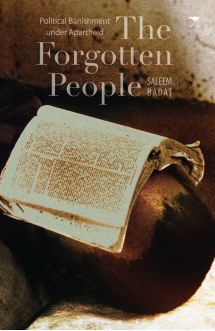
In 2001, in Unfinished Business: South Africa, Apartheid and Truth, Dumisa Ntsebeza and Terry Bell complained that ‘like so much of South Africa’s recent brutal history, we shall probably never know exactly how many people were banished and what happened to all of them’
Rhodes University Vice-Chancellor, Dr Saleem Badat’s new book The Forgotten People: Political Banishment under Apartheid answers many questions about banishment and shines a bright and welcome light on a largely hidden and unknown aspect of our ‘brutal history’.
It shows how apartheid’s political opponents from rural areas were condemned to the living hell of banishment: a weapon used to expel rural opponents to distant and often arid and desolate places for unlimited periods.
These rural opponents were plucked from their families and communities and cast, in the late Helen Joseph’s words, ‘into the most abandoned parts of the country, there to live, perhaps to die, to suffer and starve, or to stretch out a survival by poorly paid labour, if and when they could get it.’
They were strangers in strange areas who could not speak the local language, and often had little in common with the locals and even less in common with those under whose surveillance they fell. Their existence became ‘a slow torture of the soul’, a kind of social death.
Those who were banished ‘had no trial in court. They were neither charged nor told of the nature of their crimes.’ ‘They were given no opportunity to defend themselves, yet they were deprived of their liberty, of their homes. They were punished within the law, but outside justice.’
This is the first study of an important but hitherto neglected group of opponents of apartheid, set in a global, historical and comparative perspective. It looks at the reasons why people were banished, their lives in banishment and the efforts of a remarkable group of activists, led by Helen Joseph, to assist them.
Indeed, this book originated in a promise made by the author to Helen Joseph, who had undertaken an epic journey in 1962 to visit all those banished across the length and breadth of South Africa. The work is illustrated with stunning photographs by Ernest Cole, Peter Magubane and others.
Prof Colin Bundy says of the book: “An extremely impressive manuscript on an aspect of political repression that has previously received scant academic attention. For both the definitive study of banishment and the valuable overview of rural struggles in the apartheid era, this book will be welcomed by the scholarly community as an important contribution to knowledge”.
Prof Paul Maylam describes the book as “an important original contribution to South African historiography, covering a topic that has never been handled before. It gives life to the forgotten people.”
According to Advocate George Bizos who has written the Foreword to the book, “for the long years of meticulous research and finally the superb telling of the story of banishment under apartheid, we owe a great debt to the author”.
Dr Badat is also an author of Black Student Politics, Higher Education and Apartheid: From SASO to SANSCO, 1968-1990 and Black Man, You are on Your Own; co-author of National Policy and Regional Response in South African Higher Education and co-editor of Apartheid Education and Popular Struggle in South Africa.
